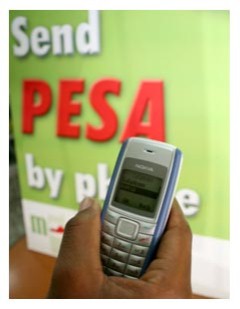| Money |
|---|
| Currency Exchange |
| Budgeting |
| Banking |
| Cashless payments |
| Insurance |
| Assessment Questions |
- Money is anything that is commonly accepted by a group of people for the exchange of goods, services, or resources and for the repayment of debt in a country.
- Every country has its own system of coins and paper money known as currency.
- For example the currency in Kenya is the Kenyan Shilling (Kshs).
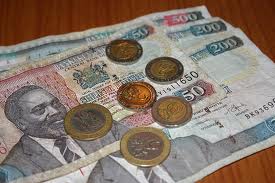
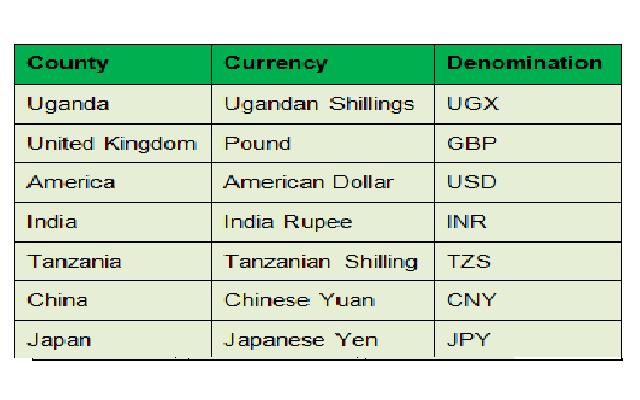
Can you name other currencies?
a) Medium of Exchange:
- The primary function of money is to act as a medium of exchange.
- People use money to buy and sell goods.
- Buyers give up money and receive goods.
- Sellers give up goods and receive money.
- Money makes transactions easier because everyone is willing to trade money for goods and goods for money.
- Without money, we would have to barter, which involves direct exchange of one good or service for another.
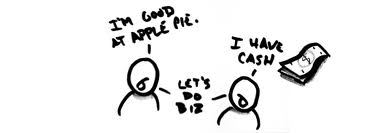
b) Store of Value:
- In order for money to remain a medium of exchange, money must hold its value over time, it must be a store of value.
- Money is a common denominator in which the relative value of goods and services can be expressed.
c) Unit of Measurement.
- Money also functions as a unit of account, providing a common measure of the value of goods and services being exchanged.
- Knowing the value or price of a good, in terms of money, enables both the supplier and the purchaser of the good to make decisions about how much of the good to supply and how much of the good to purchase.
d) Form of Deferred Payment
- This fourth function of money is used as a standard benchmark for specifying future payments for current purchases that is, buying now and paying later.
- A common example of deferred payments is a car loan.
- Njoroge got a loan to buy a car today, then pay off the loan with payments deferred into the future.
- The amount of those future payments are stated in terms of money.
- In the image below to posses the car the buyer need to make an initial deposit of 200,000 Kshs.
- An every month pay Kshs 50,000 for 6 months
- Money, as we know it today, is the result of a long process.
- Barter In the beginning of humankind, there was no money.
- Before there was money: Money was what you grew or hunted.
- Everything was traded from grains to animals.
- However giving change was difficult.
- To get goods, people traded items which had a practical value.
- This early form of barter, however, does not provide the transferability and divisibility that makes trading efficient.
- For instance, if you have cows but need bananas, you must find someone who not only has bananas but also the desire for meat.
- What if you find someone who has the need for meat but no bananas and can only offer you rabbits?
- To get your meat, he or she must find someone who has bananas and wants rabbits.
- The lack of transferability of bartering for goods, as you can see, is tiring, confusing and inefficient.
- But that is not where the problems ends: even if you find someone with whom to trade meat for bananas, you may not think a bunch of them is worth a whole cow.
- You would then have to devise a way to divide your cow (a messy business) and determine how many bananas you are willing to take for certain parts of your cow.
- Cattle as a form of money.
- This included cows, camels, goats and other animals.
- The biggest advantage of cattle is that it allowed the seller to set a price. It even brought upon the concept of standard pricing.
- For example, two goats were traded for one cow as cows were deemed to be more valuable than goats.

Cowrie Shells Shells became the first medium of exchange - money.
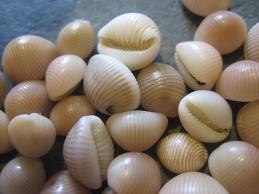
- First Metal Money and Coins Due to the inspiration from cowrie shells, China began to manufacture bronze and copper cowrie shells imitations in 1,000 BC.
- This was considered as the earliest forms of metal coins.
- Knife, spade monies and other metal tool money was also first used in China. The coins later developed into round coins made of base metals.
- It contained holes so that it could be put together just like a chain.
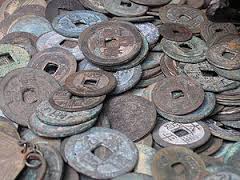
- Silver Coins Pieces of silver were the earliest coins.
- Eventually in time they took the appearance of today and were imprinted with numerous gods and emperors to mark their value.
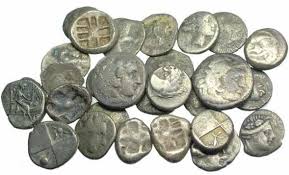
- Gold coins were introduced
- First modern paper money was introduced.
- The first notes and coins that weuse today were printed In England in 1661. Since then these notes and coins have evolved in different material, shapes, sizes and values.
- Modern coins are minted in silver, copper, nickel etc.
- And money notes are made out of special paper that withstands heavy use, wear and tear.
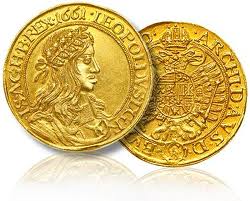
- Cheques and Bankers Drafts were introduced.
- Cheques made money move easily without having to carry cash, to make exact payments.

- Credit cards were introduced.
- Which made purchasing even more easier as banks began communication transactions through computers.
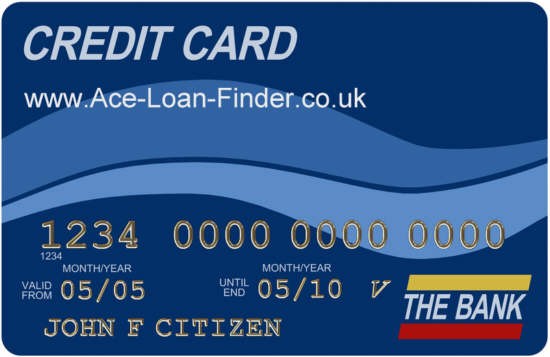
- Automated Teller Machines (ATMs) were introduced, this made money and account information more accessible.

- Debit cards were introduced to increase the functions of a bank deposit account.
- Making it convenient for consumers to make purchased.
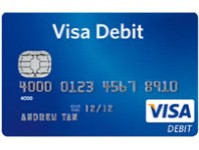
Mobile Money.
